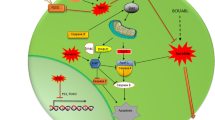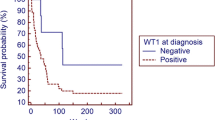Abstract
Survivin has been identified as one of the top 4 transcripts among 3.5 million human transcriptomes uniformly upregulated in cancer tissues but not in normal tissues. Therefore, we quantitatively determined the messenger RNA (mRNA) expression profile for survivin by a real-time reverse transcriptase-polymerase chain reaction (RT-PCR) technique in 113 patients with leukemias, such as adult T-cell leukemia (ATL), acute lymphoid leukemia (ALL), acute myeloid leukemia (AML), chronic myeloid leukemia in crisis, and chronic lymphocytic leukemia (CLL), and in 25 cell lines, including 7 ATL cell lines and 15 solid-tumor cell lines. Furthermore, we examined whether the plasma level of survivin protein as measured by enzyme-linked immunosorbent assay (ELISA) substituted for mRNA expression by PCR quantification. Gene expression was quantitatively confirmed to be up-regulated in approximately 90% of ATL and acute leukemia cases and in all of the cell lines tested, whereas it was down-regulated in almost all cases of CLL. Furthermore, with respect to the interpretation of the gene expression findings, attention was paid to standardization with a housekeeping gene, glyceraldehyde-3-phosphate dehydrogenase (GAPDH), in the real-time PCR quantification, because the variability in GAPDH expression among the different cell types was significant. GAPDH expression was relatively low in ATL cells and high in ALL and AML cells. The rates of increase in the levels of survivin protein in the plasma of ATL patients and in the supernatants from in vitro cultures of solid-tumor cell lines were low compared with rates of increase of the mRNA and protein level in the cells, suggesting that the protein levels in plasma do not always reflect survivin expression in tumor cells. Our findings indicate the potential clinical relevance of survivin quantified by real-time PCR but not for the protein level in plasma as determined by ELISA, especially in cases of ATL and acute leukemias.
Similar content being viewed by others
References
Altieri DC. Validating survivin as a cancer therapeutic target. Nat Rev Cancer. 2003;3:46–54.
Temme A, Rieger M, Reber F, et al. Localization, dynamics, and function of survivin revealed by expression of functional survivin- DsRed fusion proteins in the living cell. Mol Biol Cell. 2003;14: 78–92.
Ambrosini G, Adida C, Altieri DC. A novel anti-apoptosis gene, survivin, expressed in cancer and lymphoma. Nat Med. 1997;3: 917–921.
Carter BZ, Milella M, Altieri DC, Andreeff M. Cytokine-regulated expression of survivin in myeloid leukemia. Blood. 2001;97: 2784–2790.
Schmidt SM, Schag K, Muller MR, et al. Survivin is a shared tumorassociated antigen expressed in a broad variety of malignancies and recognized by specific cytotoxic T cells. Blood. 2003;102: 571–576.
Mesri M, Wall RW, Li J, Kim RW, Altieri DC. Cancer gene therapy using a survivin mutant adenovirus. J Clin Invest. 2001;108:981–990.
Kamihira S, Yamada Y, Hirakata Y, et al. Aberrant expression of caspase cascade regulatory genes in ATL: survivin is an important determinant for prognosis. Br J Haematol. 2001;114:63–69.
Nakayama K, Kamihira S. Survivin an important determinant for prognosis in ATL: a novel biomarker in practical hemato-oncology. Leuk Lymphoma. 2002;43:2249–2255.
Paydas S, Tanriverdi K, Yavuz S, Disel U, Sahin B, Burgut R. Survivin and aven: two distinct antiapototic signals in acute leukemias. Ann Oncol. 2003;14:1045–1050.
Miyachi K, Sasaki K, Onodera S, et al. Correlation between survivin mRNA expression and lymph node metastasis in gastric cancer. Gastric Cancer. 2003;6:217–224.
Hayashibara T, Yamada Y, Nakayama S, et al. Resveratol induces downregulation in survivin expression and apoptosis in HTLV-1- infected cell lines: a prospective agent for ATL chemotherapy. Nutr Cancer. 2002;44:192–201.
Mori N, Yamada Y, Hatta T, et al. Expression of survivin in HTLV-1- infected T-cell lines and primary ATL cells. Biochem Biophys Res Commun. 2001;282:1110–1113.
Sugahara K, Yamada Y, Hiragata Y, et al. Soluble and membrane isoforms of Fas/CD95 in fresh adult T-cell leukemia (ATL) cells and ATL-cell lines. Int J Cancer. 1997;72:128–132.
Yamada Y, Ohmoto Y, Yamamura M, et al. Plasma M-CSF as an indicator of response to chemotherapy in adult T cell leukemia patients. Leuk Lymphoma. 1996;22:457–461.
Kamihira S, Dateki N, Sugahara K, et al. Significance of HTLV-1 proviral load quantification by real-time PCR as a surrogate marker for HTLV-1-infected cell count. Clin Lab Haematol. 2003; 25:111–117.
Badran A, Yoshida A,Wano Y, et al. Expression of the antiapoptotic gene survivin in chronic myeloid leukemia. Anticancer Res. 2003;23:589–592.
Mori A,Wada H, Nishimura Y, Okamoto T, Takemoto Y, Kakishita E. Expression of the antiapoptosis gene survivin in human leukemia. Int J Hematol. 2002;75:161–165.
Munzert G, Kirchner D, Stobbe H, et al. Tumor necrosis factor receptor-associated factor 1 gene overexpression in B-cell chronic lymphocytic leukemia: analysis of NF-_B/Rel-regulated inhibitors of apoptosis. Blood. 2002;100:3749–3756.
Granziero L, Ghia P, Circosta P, et al. Survivin is expressed on CD40 stimulation and interfaces proliferation and apoptosis in B-cell chronic lymphocytic leukemia. Blood. 2001;97: 2777–2783.
Nakagawa Y, Yamaguchi S, Hasegawa M, et al. Differential expression of survivin in bone marrow cells from patients with acute lymphocytic leukemia. Leuk Res. 2004;28:487–494.
Ullmannova V, Haskovec C. The use of housekeeping genes (HKG) as an internal control for the detection of gene expression by quantitative real-time RT-PCR. Folia Biol (Praha). 2003;49: 211–216.
Aerts JL, Gonzales MI, Topalian SL. Selection of appropriate control genes to assess expression of tumor antigens using real-time PCR. Biotechniques. 2004;36:84–86.
Schnittger S, Weisser M, Schoch C, Hiddemann W, Haferiach T, Kern W. New score predicting for prognosis in PML-RAR+,AMLETO+, or CBFB-MYH11+ acute myeloid leukemia based on quantification of fusion transcripts. Blood. 2003;102:2746–2755.
Watanabe T. HTLV-1 associated diseases. Int J Hematol. 1997;66: 257–278.
Yasunaga J, Matsuoka M. Leukemogenesis of adult T-cell leukemia. Int J Hematol. 2003;78:312–320.
Author information
Authors and Affiliations
Corresponding author
About this article
Cite this article
Sugahara, K., Uemura, A., Harasawa, H. et al. Clinical Relevance of Survivin as a Biomarker in Neoplasms, Especially in Adult T-Cell Leukemias and Acute Leukemias. Int J Hematol 80, 52–58 (2004). https://doi.org/10.1532/IJH97.04031
Received:
Revised:
Accepted:
Published:
Issue Date:
DOI: https://doi.org/10.1532/IJH97.04031




